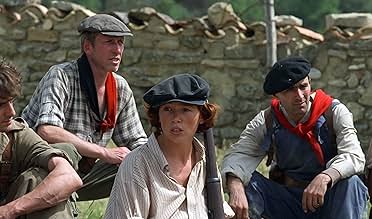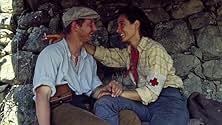David es un comunista desempleado que llega a España en 1937 durante la guerra civil para unirse a los republicanos y defender la democracia contra los fascistas. Se hace amigo de los soldad... Leer todoDavid es un comunista desempleado que llega a España en 1937 durante la guerra civil para unirse a los republicanos y defender la democracia contra los fascistas. Se hace amigo de los soldados.David es un comunista desempleado que llega a España en 1937 durante la guerra civil para unirse a los republicanos y defender la democracia contra los fascistas. Se hace amigo de los soldados.
- Dirección
- Guionista
- Elenco
- Nominada a1 premio BAFTA
- 8 premios ganados y 5 nominaciones en total
- Maite
- (as Iciar Bollain)
- Juan Vidal
- (as Marc Martinez)
- Bernard Goujon
- (as Frederic Pierrot)
- Militia member
- (as Andres Aladren)
- Militia member
- (as Roca)
- Militia member
- (as Emili Samper)
- Dirección
- Guionista
- Todo el elenco y el equipo
- Producción, taquilla y más en IMDbPro
Opiniones destacadas
A left-wing lad goes to Spain, joins the otherwise totally obscure Marxist POUM militia, and experiences at first hand serious political differences with the Communists and their competing militia. Well, the lad does not actually get wounded in the throat during the course of the movie, but otherwise this is the biography of Eric Blair (George Orwell), as described in his book "Homage to Catalonia".
In spite of the single source cribbing, I did like this film in general since films about Spain in English, other than Canadian ones with Donald Sutherland as Dr. Norman Bethune, are few and far between.
It was wonderful to see a priest being shot in this film -- I don't mean it that way! -- since anti-clericalism was an important element both in the Spanish Civil War and in the French Revolution although it rarely seems to be mentioned much in the English-speaking world. The people in both countries felt the burden of traditional, oppressive, hypocritical Catholicism, just like the kind we had here in the Province of Quebec before the Quiet Revolution of the 1960's. At the other end of the political scale, the poor treatment of priests in Spain was a motivating force for Fascists in France to join the Charlemagne division of the Waffen SS to defend the cause of Christianity, or so The Sorrow and the Pity attests.
The Spanish war was about liberation from autocracy amidst a blizzard of competing, doctrinaire, left political philosophies. That was a really exciting time to be politically active, and there is a great scene of grassroots socialism in action at a town meeting.
The film has a rough-hewn, half-finished look characteristic of Ken Loach, but don't let that put you off. Anyone who can get worked up about the sometimes microscopic, casuistical differences between the Grits and the Tories, or the Democrats and the GOP, or New Labour and those other Tories, or Labor and National, or the SDP and the CDU, etc. should really love a movie, and a conflict, where the political spectrum is so broad for a change. Political animals of whatever bent should get a kick out of it.
Truthfully I could care less about the politics of this tragic episode in world history, BUT the director,by his sheer genius & craftsmanship made me sit at the edge of my seat & pay close attention. Subtitles are used sparingly & it is hard to make some of the dialogue out due thick accent, The acting is so skillfull you needed no dialogue,you are able to understand each actors feelings & emotions. Credit this to Mr.Loach, The only actor I have heard of in this film is the lead IAN HART/ He & all the others do an excellent job. This film was made in 1995, & barely released,another example of distributors not knowing a GREAT film from a hole in the ground. Even this is a war film, there is very little violence, a good history lesson for the younger ones, then a trip to the library to find out more.
My rating is ***1/2 95/100 points 9 on IMDb
The crimes of the Stalinists are portrayed throughout the film -- they deny decent, modern weapons to those sections of the front which they do not control; they actively engage in repression against the POUM and the anarchists in Barcelona; in the pages of the British Daily Worker which we briefly see on the screen, we are shown the daily barrage of lies they spread (such as Trotsky's 'support' for Franco fascism).
Anyone who sees this film as simply a black-and-white, good vs evil portrayal of heroic young people aiding the brave Spaniards in their battle for freedom is missing what is, I believe, its main point. It is not primarily about Spain.
Seeing a film like this, I cannot forget the more typical Hollywood portrayals (at least in the last generation) of Communists. A film like "The Way We Were" shows the American Communist Party only during those moments when its positions would today be considered palatable (supporting the Spanish republic, backing Roosevelt and the US war effort in World War II, and later calling for nuclear disarmament).
It doesn't show the time of the Moscow Trials, nor the real role played by the Soviet Union and its agents in Spain, nor the Communist Party's opposition to fighting Hitler and the Nazis in 1939-41, nor the post-war period when the Party did what it could to encourage nuclear proliferation by passing on atomic secrets to Stalin.
Land and Freedom does try to show one of the Comintern's uglier moments, to its credit.
A film like this was made possible by the fact that Loach comes out of the British far left, and the British far left has long been dominated not by Stalinists but by their Marxist opponents -- primarily the Trotskyists of the Socialist Workers Party (SWP). Whatever disagreements I or others may have with the SWP (and they are many), at least they rejected Stalinism.
What we need are more films like this showing the real role played by Communist Parties all during the history of the Soviet regime. For example a film set in any European country during the period between September 1939 and June 1941 (the time of the Hitler-Stalin pact) which honestly portrays Communist parties as allies of the Nazis (even in occupied countries like Norway and France) would be welcome.
British director Ken Loach made a film that finally attempts an anarchist's view of anarchists in Spain during the civil war against the fascists. The victors write history, so as losers of that war, their history has for too long remained untold. But this 1995 film, "Land & Freedom" shows what they were fighting for and what they were fighting against. One of the best aspects here is that the film also shows how the communists aggressively destroyed the anarchists more than their supposed common enemy. This I take as a lesson for today's left:
The melancholy hopelessness of our own 21st century is a consequence of that tragic defeat by the fascists -- largely because the Left fragmented and was brutally dominated by Leninist dictators. Historical progress is now merely spinning its wheels in futility, recycling every old thing again as a farce. The only solution is land and freedom.
P.S. Another sympathetic film based on these events is "For Whom the Bell Tolls" (1943) based on the Hemingway novel, starring Gary Cooper and Ingrid Bergman. This one is less politically aware however, so it focuses more on the romance. See info at http://www.imdb.com/title/tt0035896/combined
¿Sabías que…?
- TriviaAccording to Ken Loach, the debate in the village was the key scene in the film. He had local residents from the village play crowd members in that meeting.
- ErroresActually the rucksacks are the same as British 1908 pattern, and were made from 1929 onwards by La Industria Lonera in Barcelona, Spain.
- Citas
[last lines]
Kim, David's granddaughter: The other day I found this. It was amongst my granddad's papers, and I just thought it was, like, fitting for him. It's a poem by William Morris, and I'd just like to read it out: "Join in the battle, wherein no man can fail. For whoso fadeth and dieth, yet his deeds shall still prevail."
- Créditos curiososSpecial thanks to the people of Mirambel and Morella.
- ConexionesEdited from Caudillo (1977)
- Bandas sonorasA Las Barricades
Courtesy of Confederación de Nacional dl Trabajo
Selecciones populares
- How long is Land and Freedom?Con tecnología de Alexa
Detalles
- Fecha de lanzamiento
- Países de origen
- Idiomas
- También se conoce como
- Tierra y libertad
- Locaciones de filmación
- Productoras
- Ver más créditos de la compañía en IMDbPro
Taquilla
- Presupuesto
- GBP 2,500,000 (estimado)
- Total en EE. UU. y Canadá
- USD 228,800
- Fin de semana de estreno en EE. UU. y Canadá
- USD 8,144
- 17 mar 1996
- Total a nivel mundial
- USD 228,800
- Tiempo de ejecución1 hora 49 minutos
- Color
- Mezcla de sonido
- Relación de aspecto
- 1.66 : 1
Contribuir a esta página































